Unleased in the latter half of 2022, OpenAI’s ChatGPT has taken the world by storm and promises to close the gap between AI’s once far-flung usage and its potential ubiquity in our everyday lives.
From banking, marketing, insurance, healthcare, manufacturing, and technical jobs, AI-empowered solutions like ChatGPT are impacting major sectors worldwide and have permanently re-routed the trajectory of work as we currently understand it.
While new job creation and the ability to drastically improve productivity capabilities emerge from the unveiling of ChatGPT, so does the potential loss of countless jobs more easily and efficiently completed by this AI-powered chatbot.
In this article, we’ll highlight newly emergent jobs and skills for utilizing this nascent tool, and explore a new frontier of AI jobs and its vast array of potential applications.
We’ll also identify the positions at risk of becoming replaced by ChatGPT, delving into which roles will be most affected and how to manage AI’s impact on the future of work.
The Impact of ChatGPT and AI on new and existing jobs
ChatGPT has impacted various industries, including customer support and service, content generation and marketing, virtual assistants, language translation, research and data analysis, creative writing and storytelling, and personalized learning and education.
A report by Goldman Sachs shows advances in AI automation can potentially expose approximately 300 million full-time jobs worldwide to redundancy.
However, the same research suggests these advancements could benefit the macro-economic landscape. Tools utilizing advances in natural language processing, such as ChatGPT, are forecasted to generate a 7% increase in global GDP, translating to nearly $7 trillion over ten years.
ChatGPT’s ability to understand and generate human-like text has reimagined processes, enhanced user experiences, and increased productivity across these sectors.
While certain jobs may be at risk of automation or transformation, new job opportunities may also emerge due to advancements in AI. From automation to content generation, AI systems like ChatGPT are transforming industries and unlocking new avenues of opportunity.
There’s a spike in demand for professionals with expertise in artificial intelligence who can contribute to AI development, implementation, and optimization. As a result, a range of new job listings has emerged on job recruitment sites seeking candidates with specialized skills as “AI specialists.”
Which Sectors Will be Impacted Most by AI?
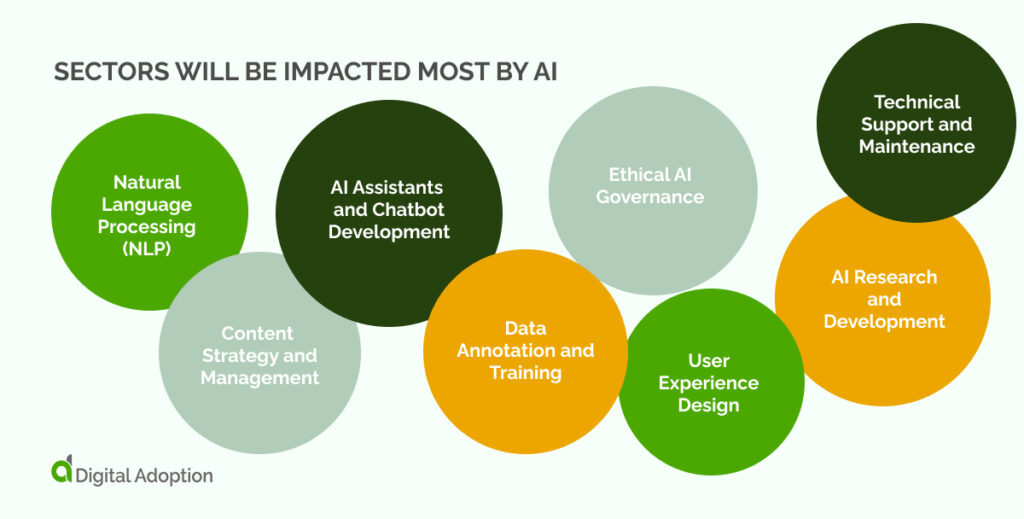
As ChatGPT continues to evolve and be integrated into different industries, its impact will likely expand further, driving innovation and transforming how we work and engage with AI.
Below are a few sectors where ChatGPT significantly impacts new and existing jobs:
AI Assistants and Chatbot Development
The rise of ChatGPT has created a demand for professionals with expertise in developing AI assistants and chatbots. These professionals are responsible for designing, training, and deploying conversational AI models to enhance customer experiences and automate tasks in various industries.
Natural Language Processing (NLP)
ChatGPT relies heavily on NLP techniques to understand and generate human-like text. As a result, there is a growing need for NLP specialists who can develop algorithms, models, and applications that improve language understanding and generation capabilities.
Content Strategy and Management
With ChatGPT’s ability to generate compelling content, content strategists’ and managers’ roles are evolving. These professionals now focus on curating and optimizing AI-generated content, ensuring it aligns with brand messaging and resonates with target audiences.
Data Annotation and Training
ChatGPT requires extensive training data to perform effectively. Data annotators play a crucial role in preparing high-quality datasets by labeling and categorizing text samples used to train and fine-tune AI models like ChatGPT.
Ethical AI Governance
The need for ethical AI governance and policy experts grows as AI becomes more prevalent. These professionals ensure AI systems like ChatGPT adhere to ethical guidelines, address biases, and protect user privacy.
User Experience Design
Creating seamless and intuitive user experiences with AI-powered chatbots and virtual assistants is essential. User experience (UX) designers work closely with AI developers to design conversational interfaces that are user-friendly, efficient, and meet user needs.
Technical Support and Maintenance
AI systems like ChatGPT require ongoing support and maintenance. Technical support professionals specialize in troubleshooting issues, ensuring optimal performance, and implementing updates to enhance the functionality and accuracy of AI models.
AI Research and Development
Developing advanced AI systems like ChatGPT relies on continuous research and innovation. AI researchers and developers are at the forefront of advancing AI capabilities, exploring new algorithms, and pushing the boundaries of what AI can achieve.
Recent reports reveal that OpenAI has launched a platform that allows users to create custom versions of ChatGPT for specific use cases without coding. This can empower individuals and organizations to leverage the tool to enhance productivity.
Jobs Being Automated by ChatGPT and AI
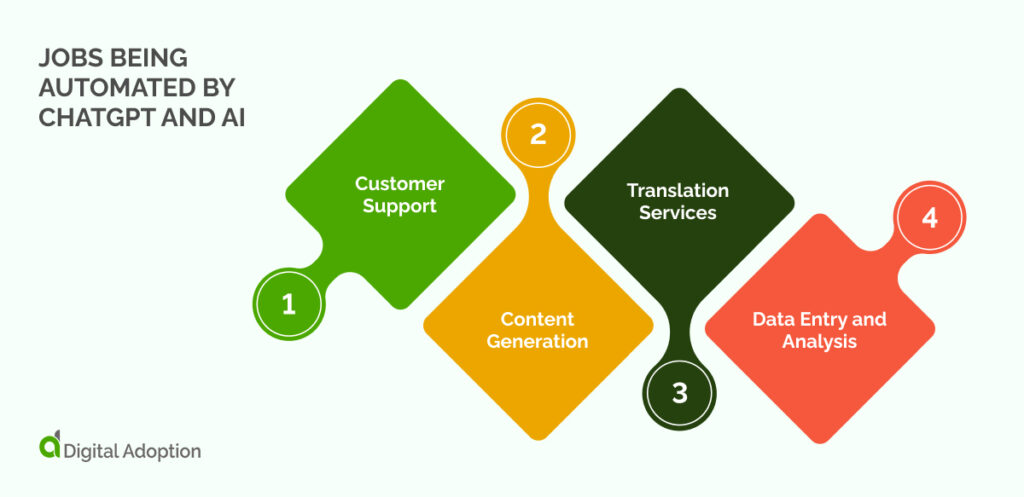
While ChatGPT and LLMs offer tremendous opportunities, they also raise concerns about the potential displacement of certain jobs.
According to internal documents and sources shared via CNBC, ChatGPT could theoretically qualify for a level-3 software engineer position at Google.
The ability of these models to understand and generate human-like text has the potential to make some jobs obsolete, with a particular impact on professions that heavily rely on language-based tasks.
Customer Support
ChatGPT’s natural language processing capabilities could revolutionize customer support by providing instant responses and assistance. This may reduce the need for manual customer service representatives as AI systems become more adept at addressing customer queries and resolving issues.
Content Generation
Writers and creators may compete with AI-powered systems that generate high-quality articles, blog posts, and creative works. While human creativity and nuance are difficult to replicate, AI models like ChatGPT can produce vast amounts of content quickly, potentially impacting certain sectors of the publishing industry.
Translation Services
With their ability to process and generate text in multiple languages, language models like ChatGPT potentially threaten professional translators. As AI translation systems improve, they may increasingly replace human translators for certain routine translation tasks.
Data Entry and Analysis
AI models have the potential to automate data entry and analysis tasks, reducing the need for manual data entry operators and analysts in some industries. This could lead to increased efficiency but may also result in job displacement.
Managing the Impact of AI Responsibly
Whether it be valid concerns around infactuality, bias, and misuse, the material risks and concerns about the widespread use of AI tools like ChatGPT are too severe to ignore.
For instance, it has occasionally generated incorrect or misleading information, as it relies on patterns and data from the internet, which may include inaccuracies.
ChatGPT has also exhibited bias in its responses, reflecting the biases present in its training data. This can perpetuate societal preconceptions and prejudices, potentially reinforcing harmful stereotypes or promoting misinformation.
Contextual understanding can also be a challenge for ChatGPT, leading to responses that may need more coherence or address specific user queries accurately.
However, when implemented responsibly, ChatGPT’s potential applications are endless if developed and deployed thoughtfully and ethically.
Below are solutions organizations can leverage for responsibility to manage the impact of AI.
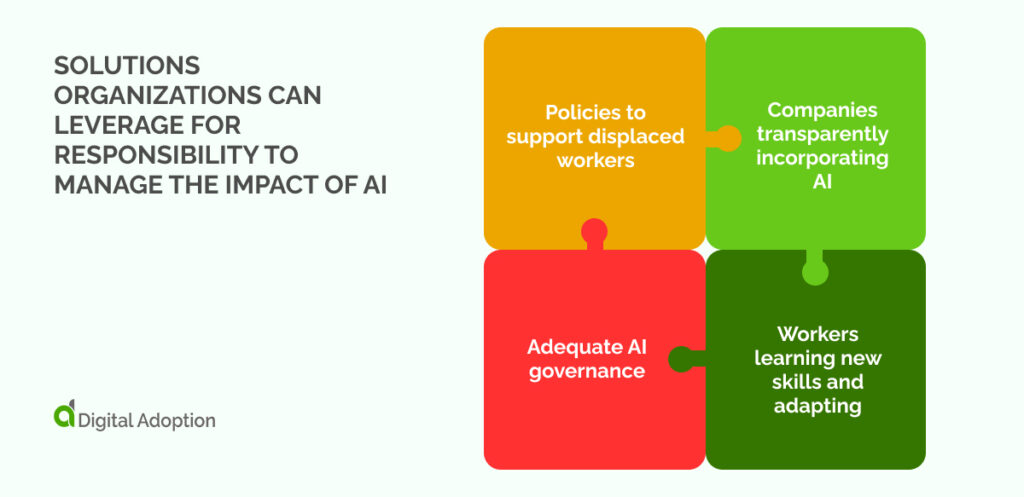
- Policies to support displaced workers: Companies and governments can implement policies and initiatives to help workers whose jobs may be affected by AI automation. This includes providing retraining programs, job placement services, and financial assistance to facilitate the transition into new roles or industries.
- Companies transparently incorporating AI: Organizations should adopt transparent practices when implementing AI systems. This involves communicating AI technologies’ intended use and potential limitations to users, customers, and stakeholders. Transparency builds trust and accountability, ensuring responsible deployment of AI.
- Workers learning new skills and adapting: As AI technology evolves, workers need to learn new skills and adapt to changing job requirements continuously. Investing in training and upskilling programs can help employees acquire the necessary capabilities to work alongside AI systems effectively. This approach encourages resiliency and empowers individuals to embrace the opportunities presented by AI.
- Adequate AI governance: Establishing robust governance frameworks for AI is crucial. This involves developing guidelines, regulations, and ethical standards for responsible AI development and deployment. Clear guidelines should address bias mitigation, data privacy, and algorithmic transparency. Effective governance mechanisms promote ethical and accountable AI practices.
AI & The Future of Work
Sophisticated AI-driven tools like ChatGPT are reshaping the nature of work, with major sectors experiencing a major shift towards digital transformation.
Unsurprisingly, AI is at the forefront of this new wave—its potential applications in supporting productivity are all too valuable to ignore.
AI tools are here to stay and will only become more ubiquitous in professional and wider social spaces as AI technology improves and new iterations emerge.
According to Business Insider, AI can replace various job roles. Among those at high risk are coders, computer programmers, software engineers, data analysts, advertising jobs, content creation jobs, technical writing jobs, journalism jobs, paralegals, and legal assistants.
The impact of ChatGPT and AI on the future of work will continue to raise important questions regarding society’s overall well-being.
It remains to be seen whether the automation of certain tasks will lead to widespread job displacement due to AI advances.
Today, AI has the potential to reimagine industries, facilitate innovation, and heighten efficiency levels across sectors.
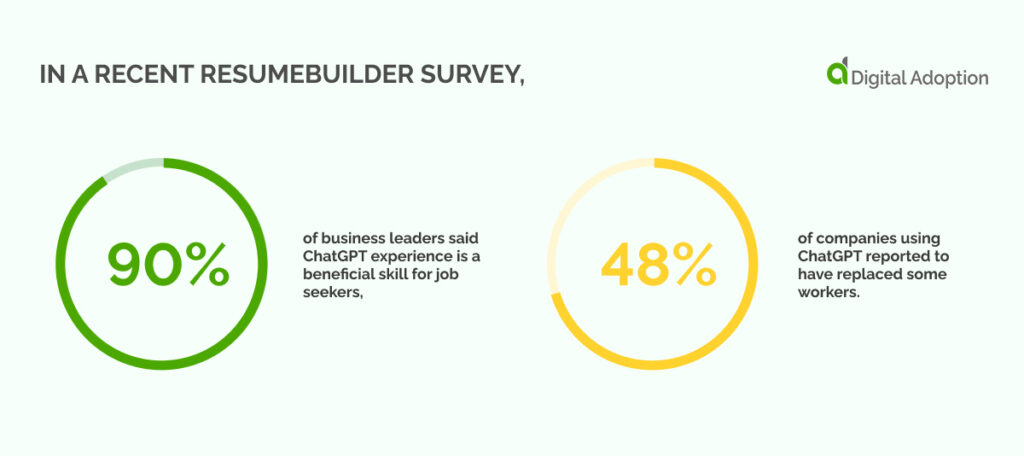
In a recent ResumeBuilder survey, 90% of business leaders said ChatGPT experience is a beneficial skill for job seekers, with 48% of companies using ChatGPT reported to have replaced some workers.
With AI augmenting certain roles, it frees up time for innovation. It can potentially increase human productivity in other areas—providing opportunities for individuals to focus on more creative and complex work.
Regardless, organizations on their transformation journey must address ethical considerations and ensure that AI is developed and deployed responsibly to mitigate unintended consequences.

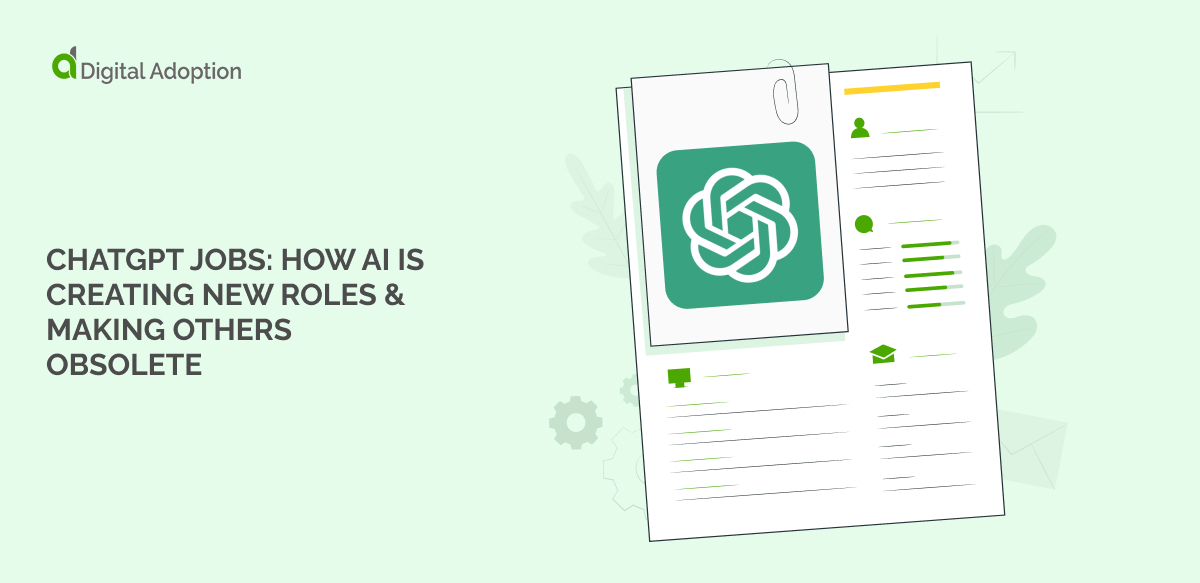


![18 Examples of AI in Finance [2025]](https://www.digital-adoption.com/wp-content/uploads/2025/06/18-Examples-of-AI-in-Finance-2025-300x146.jpg)
![14 Examples of AI in Manufacturing [2025]](https://www.digital-adoption.com/wp-content/uploads/2025/06/14-Examples-of-AI-in-Manufacturing-2025-300x146.jpg)
![29 Examples of AI in Education [2025]](https://www.digital-adoption.com/wp-content/uploads/2025/06/29-Examples-of-AI-in-Education-2025-300x146.jpg)
![15 Examples of AI in Retail [2025]](https://www.digital-adoption.com/wp-content/uploads/2025/06/15-Examples-of-AI-in-Retail-2025-300x146.jpg)
![13 Examples of AI in Healthcare [2025]](https://www.digital-adoption.com/wp-content/uploads/2025/06/AI-in-healthcare-examples-300x146.jpg)


![18 Examples of AI in Finance [2025]](https://www.digital-adoption.com/wp-content/uploads/2025/06/18-Examples-of-AI-in-Finance-2025.jpg)
![14 Examples of AI in Manufacturing [2025]](https://www.digital-adoption.com/wp-content/uploads/2025/06/14-Examples-of-AI-in-Manufacturing-2025.jpg)
![29 Examples of AI in Education [2025]](https://www.digital-adoption.com/wp-content/uploads/2025/06/29-Examples-of-AI-in-Education-2025.jpg)